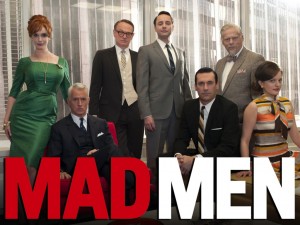
From ricmeyers.com
Say it isn’t so! The season finale of Mad Men is right around the corner. While some have been on anachronism watch, we’ve been keeping our ears open for words that we like. From slang to advertising lingo to words of the time, we’ve gathered our favorites here, even managing to notice one out-of-place term (see sicko). Ben Zimmer would be so proud.
UPDATE: Sicko may not be an anachronism after all. Thanks to Ben Zimmer for the detective work!
bitchin’
Peggy [holding up Michael’s work]: “Have I lost my sense of smell or is this good?”
Stan [laughs]: “That’s bitchin’.”
“Tea Leaves,” April 1, 2012
Bitchin’ is slang for “excellent; first-rate,” and originated as “teen/surfer slang” in the 1950s. The word apparently plays on the verb sense of bitch, to complain, “in some inverted sense.”
calice
Megan [upon realizing Don’s surprise party has been spoiled]: “Calice.”
“A Little Kiss,” March 25, 2012
Calice is a Québécois French swear word which, according to Slate, “has its origins in Roman Catholic ritual—it’s the communion chalice.” Other French-Canadian swear words, says Slate, include “Calvaire! (Calvary), Ciboire! (ciborium—the container in which communion wafers are stored), Ostie! (communion wafer), or Tabarnak!” Tabarnak is the Québécois equivalent of fuck and comes from tabernacle.
consumerism
Megan [to Don]: “I didn’t think [the play] was such a strong stand against advertising as much as the emptiness of consumerism.”
“Christmas Waltz,” May 20, 2012
The word consumerism, which was coined in 1944, originally meant “the movement seeking to protect and inform consumers by requiring such practices as honest packaging and advertising, product guarantees, and improved safety standards.” Around 1960, it came to refer to “the theory that a progressively greater consumption of goods is economically beneficial,” and by extension an “attachment to materialistic values or possessions.” Here Megan is referring to this last meaning of consumerism.
fresh
Betty [to Don]: “I wanted to know if you’d have any problem with me strangling Sally. I’m not joking. She’s fresh. And I prefer to not have her sourpuss ruining our trip.”
“Commissions and Fees,” June 3, 2012
Fresh in this context means “verdant and conceited; presuming through ignorance and conceit; forward; officious.” This sense originated in 1848 as U.S. slang, probably from the German frech, “insolent, cheeky,” which ultimately comes from the Old English frec, “greedy, bold.”
go ape
Hanson/Handsome: “Billy Josephs and I were supposed to join up, but my dad went ape.”
“Signal 30,” April 15, 2012
To go ape means “to become wildly excited or enthusiastic,” and is attested from 1955. “I Go Ape” is a 1959 hit song from Neil Sedaka. To join up means “to enlist or enroll,” and originated around 1916.
grabass
Don: “Now knock off the grabass and give me some lines.”
“The Other Woman,” May 27, 2012
Grabass means “horseplay; play fighting, wrestling.” We couldn’t find an exact date of origin but the term has been in use at least since the mid-1940s, perhaps beginning as military slang. Also playing grabass.
half-assed
Peggy [to Don]: “You didn’t want to rehearse. You ran through it one time half-assed.”
“Lady Lazarus,” May 6, 2012
Half-assed is slang for “not well planned or executed” or “incompetent.” The word originated around 1932 and may be “a humorous mispronunciation of haphazard.”
Hare Krishna
Mother Lakshmi: “Hare Krishna, Harry.”
“Christmas Waltz,” May 20, 212
Hare Krishna refers to “a chant to the Hindu god Krishna”; a “member of the International Society for Krishna Consciousness (ISKCON), founded in the United States in 1966”; and “the society itself.” Hare translates from the Hindi as “O God!”
hep
Pete: “[The New York Times is] doing some literary profile on hip agencies.”
Bert: “Hep.”
“Dark Shadows,” May 13, 2012
Hep, first recorded in 1908, is slang for “aware, up-to-date.” However, with the rise of hip in the 1950s, says the Online Etymology Dictionary, “the use of hep ironically became a clue that the speaker was unaware and not up-to-date.” The speaker here is Bertram Cooper, and his use of hep is made even more ironic as he corrects Pete on his “hipper” language.
line
Don: “What’s the line?”
Peggy: “Doesn’t need one.”
“Dark Shadows,” May 13, 2012
Line is an advertising term that may be short for tagline or strapline.
mad money
Don: “Car fare, in case it doesn’t work out.”
Joan: “Mad money? Thank you.”
“Christmas Waltz,” May 20, 212
Mad money is “a sum of money, often relatively small in amount, kept in reserve to use for impulsive, frivolous purposes.” The term is attested from 1922, playing on the mad meaning of “wildly or recklessly frolicsome.” In this scene, the mad money is a from Don Draper, a “mad man,” with mad referring to Madison Avenue, slang for “the American advertising industry,” but also recklessness, derangement, or rage.
RFP
Roger [to Lane]: “A little bird told me you had an RFP from Jaguar.”
“Signal 30,” April 15, 2012
RFP stands for request for proposal, which “is issued at an early stage in a procurement process, where an invitation is presented for suppliers, often through a bidding process, to submit a proposal on a specific commodity or service.” Part of that proposal may be an SOW, or statement of work.
shakedown
Harry [to Mother Lakshmi]: “If this is some kind of shakedown, let me stop you right there. I know you’re trying to recruit me.”
“Christmas Waltz,” May 20, 212
Shakedown is slang for “extortion of money, as by blackmail,” and “a thorough search of a place or person.” When the word came about around 1730, it originally meant “a temporary bed made by shaking down or spreading hay, rushes, or the like, or also quilts or a mattress, with coverings, on the floor, on a table, etc.” The “extortion” meaning is attested from 1872, and “thorough search” from 1914, says the Online Etymology Dictionary, “both probably from the notion of measuring corn.”
sicko
Michael [to Peggy, Megan, and Stan gawking over gory pictures]: “You know what? You’re sickos.”
“Mystery Date,” April 8, 2012
A sicko is “a deranged, psychotic, or morbidly obsessed person.” The word plays off sick in the way weirdo plays off weird. But while weirdo originated in 1955, sicko didn’t come about until 1977, according to the Online Etymology Dictionary. Therefore, sicko is a likely anachronism in this episode, which takes place in 1966. However, Ben Zimmer pointed out a Los Angeles Free Press movie advertisement dated April 16, 1965:
LARRY MOYER’S “THE MOVING FINGER”
Winner “Best Director” Award
San Francisco Film Festival
SEE…Freakos…wierdies (sic)…sickos…corrupt fuzz…faggots…wasted youth…smut…
The episode takes place in 1966 so sicko may not be an anachronism after all. Thanks, Ben!
square
Megan [to Don]: “You’re so square, you’ve got corners.”
“Tea Leaves,” April 1, 2012
Square is slang for “a person who is regarded as dull, rigidly conventional, and out of touch with current trends.” The word originated around 1300, says Online Etymology Dictionary, and came to mean “honest, fair,” in the 1560s; “straight, direct” around 1804; and “old-fashioned” in 1944 as “U.S. jazz slang, said to be from shape of a conductor’s hand gestures in a regular four-beat rhythm.” Squaresville originated around 1956.
A 1771 word, square-toes, has a similar meaning to square: “a precise, formal, old-fashioned personage,” from “a style of shoes then fallen from fashion.”
turn on
Sandy: “I say we postpone this conversation until after we turn on.”
“Far Away Places,” April 22, 2012
To turn on means to “get high, stoned, or drugged,” and seems to come from the phrase popularized by American psychologist Timothy Leary, turn on, tune in, drop out. Leary first used the phrase at a press conference in New York City on September 19, 1966, urging “people to embrace cultural changes through the use of psychedelics and by detaching themselves from the existing conventions and hierarchies in society.”
U-2
Pete: “I know. Because he hovers over your desk like a damned U-2. You think he’s looking at your breasts? He’s looking at my calendar!”
“A Little Kiss,” March 25, 2012
A U-2 is “a single-engine, very high-altitude reconnaissance aircraft operated by the United States Air Force (USAF) and previously flown by the Central Intelligence Agency (CIA).” It was nicknamed the Dragon Lady and first developed in the mid-1950s.
What are some of your favorite words from the series?
[Photo: Mad Men Season 5, from ricmeyers.com]

